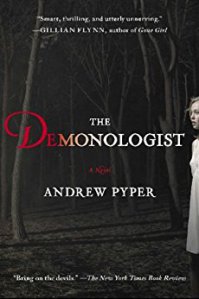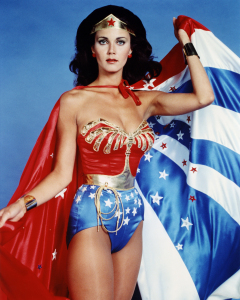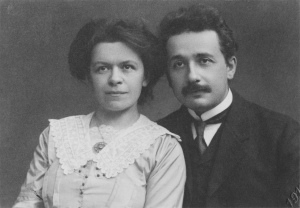Once again, I’ve been away too long. In my defense I can only offer a few new reviews over at HorrorTalk. But to prove what a good scholar of scary stuff I am, today I’ve got a double-whammy book review of two very different kinds of horror novels.

(Amazon)
Andrew Pyper’s The Demonologist is the story of David Ullman, a literature prof at Columbia University who is summoned under mysterious circumstances to Venice. Thinking the whole thing a lark, Ullman brings his daughter Tess along. In Venice Ullman witnesses–and is compelled to film–a demoniac, a man possessed by a dark spirit. It seems that the demon has chosen Ullman to be its messenger to the world, and to ensure he does his part, it possesses his daughter and forces her to jump from the roof of their hotel into the canals of Venice. Tess’ body is never found, and Ullman returns to the US broken and haunted.
The rest of the novel is Ullman’s scattered, slightly nonsensical quest to understand what the demon wants him to do, based on the vague hope that Tess is still alive and will be returned to him if he plays his part well enough. The demon sends him vague clues about places to go and people to meet, all as a way of bearing witness to the reality of Hell and its powers. To add a sense of urgency, David is pursued by an unnamed hitman, apparently sent by the Church, who have a vested interest in covering up the proof of demonic influences in the world. (This part doesn’t quite make sense to me: you’d think the church could benefit from proof of supernatural evil in the world, using its position as arbiter of God’s will to exert greater control over society. But what do I know?)
Certain things about The Demonologist rub me the wrong way. Chief among these are the snarky, off-the-cuff dialogue and narration. Told in the first person, the book has more asides, more vaguely philosophical meditations on the demonic and parenthood, than it has forward action. Ullman and his love interest, a psychologist named O’Brien, have conversations that reflect a typically non-academic, Whedonian view of what academics are like. But we’re not like that. Nobody talks like that. And making scholars summarize ancient texts and vague cultural theories in dialogue irks me. In Pyper’s defense, the whole premise is that Ullman is chosen in part because of his expertise in Milton, and the idea of scholarship as such is important to the novel. But I’ve said before that I’m more willing to accept the supernatural as a basic premise in a horror story than to accept unrealistic portrayals of everyday life, and that holds true here. It’s fine to define demons and portray them in a certain way; we have no frame of reference. (Or at least, most of us don’t.) But we do have a frame of reference for scholarship, and it’s not like this.
For all that The Demonologist is worth a read. It’s not frightening and it’s not particularly innovative, aside from the way it sort of grafts The Exorcist onto The Da Vinci Code, but it has an interesting villain and a number of memorable scenes.


(Amazon)
The Loney by Andrew Michael Hurley is a different beast entirely. The title refers to a (fictional) stretch of northeastern English coast, famous locally for its treacherous waters and terrible weather. The novel is told from the perspective of a man identified only as Smith, who as a child belonged to an extraordinarily religious Catholic family. Smith’s brother Hanny is afflicted with an undefined developmental disorder, unable to speak and with the mind of a child. For several years Smith’s family made a pilgrimage to a shrine at the Loney in the hopes that God would heal Hanny. On the last of these trips some very unusual things happened, and Smith, from his vantage in the present, slowly unwinds the tale of that fateful trip forty years ago that somehow did lead to the miraculous healing of his brother.
If you’re considering plunging into The Loney, be warned that it is incredibly, ponderously, creakingly slow. This is not a Stephen King novel, with a series of frightening set pieces to look forward to, sandwiched between expository dialogue. This is an extended meditation on the brutal, bleak environment of the north of England, and if you like that sort of thing, you’ll love it. But if you don’t, if you’re expecting scares and creeping doom and eldritch horrors, you’ll be disappointed.
I consider all of the above to be strengths, and like other Gothic novels (especially this one), The Loney actually made me want to exist in the place it describes, despite knowing that there is in fact horror hidden there. I also appreciate the commentary on religious fundamentalism–Smith’s family and friends, and their entire parish, are absolutely nutty with faith–and expected the horror, when it came, to come from that quarter. Part of the genius of Hurley’s story, though, is that the horror doesn’t actually come from religious zealotry at all. Unthinking faith is scary enough, sure, and can lead people to do awful things; but there’s something else here, something totally outside the purview of the church (today, anyway), that is far worse than those mundane evils. What that something is isn’t really defined and only appears in the closing pages of the novel, but for once the unanswered questions don’t feel like lazy storytelling to me. Instead they are an integral part of the story. And it’s clear enough, with a little reflection, what’s really going on, what force is actually responsible for healing Hanny.
The issue of religion is worth lingering on here. I was raised Catholic–meaning, as I’ve likely said before, that I’m now thoroughly agnostic. But I’ve never encountered anything like the fundamentalist version of Catholicism Hurley describes. I’m from the US, of course, and there can be no question that Catholicism in the US is different than in other places. (If The Loney were set in the US, I suspect the main characters would be Evangelicals rather than Catholics.) My research in Ireland did bring me into contact with a different flavor of Catholicism, one more like what Hurley describes, though there was never the kind of desperate zealotry of Smith’s fellow parishioners. Given his name and the occasional references to Northern Ireland (a character in the novel, a priest, is originally from there), I’m guessing that Hurley himself has some direct experience with Irish Catholicism. But I wonder what effect his position as an English teacher in the UK has had on his view of the Catholic church. In days past Catholics were regarded as among the most superstitious of all Christian sects, and that stereotype is reflected in The Loney. On the other hand, the character of Father Bernard, the Irish priest, is a far more progressive, Vatican II-style Catholic than the parish he comes to preside over, and the lone voice of reason among the pilgrims to the Loney. There’s a lot to unpack here, in other words.
True to form I’ve taken a long time to make a simple point: I liked this book. The Loney is a strange, slow, wonderful novel, and I highly recommend it.







